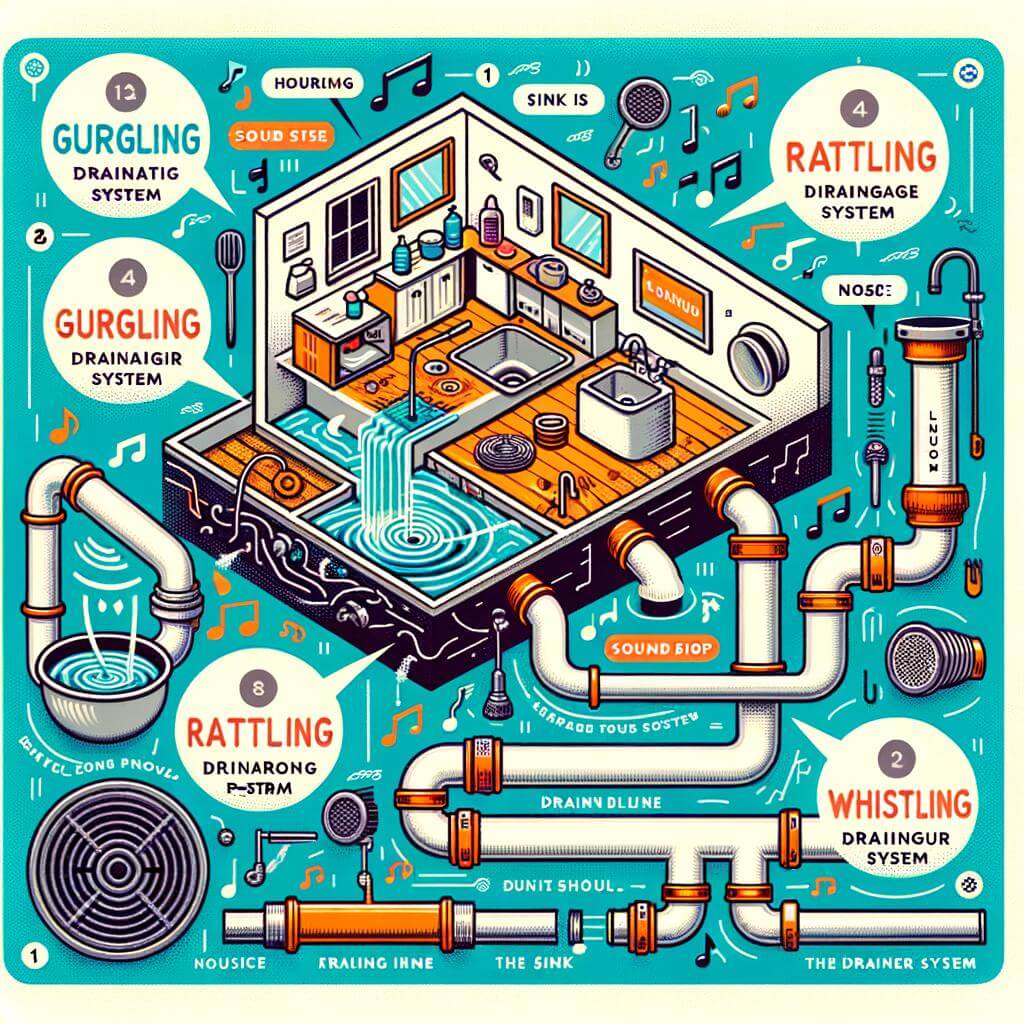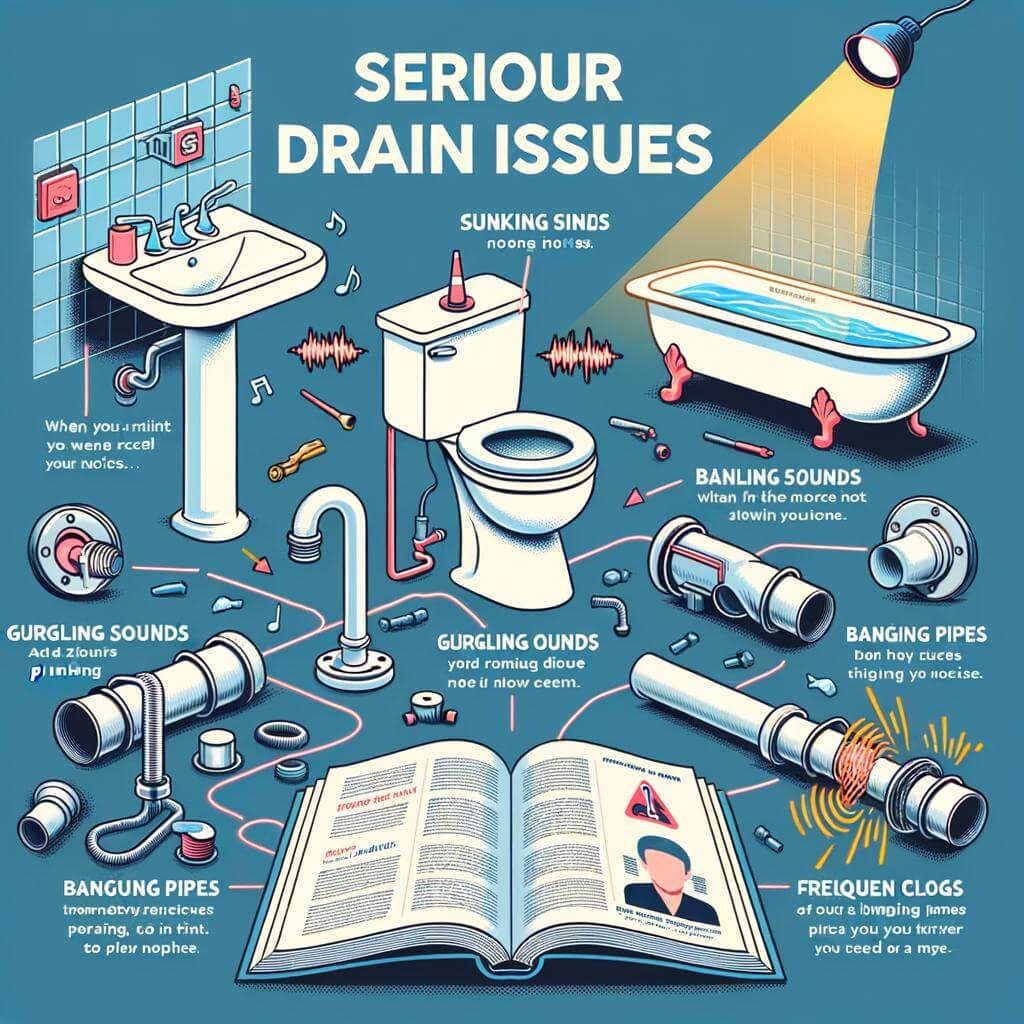Welcome! This post is dedicated to helping you decipher the strange noises coming from your drains. Have you been continually disrupted by unusual sounds whenever you use the sink or the shower? Before panic sets in, be informed that such noises are boilerplate for many households.
In our comprehensive guide, “Understanding Why Your Drain Noises: An Expert’s Insight”, you’ll gain tremendous value by learning the causes of these sounds, and discern between what’s normal and what signifies a problem needing immediate attention. Our expert advice will enable you to effectively troubleshoot your plumbing system and possibly prevent serious issues from developing.
Get ready to equip yourself with key insights and adhere to a more proactive approach towards your home maintenance. Let’s dive in and make sense of these mystifying drain noises!
Understanding the Common Causes of Drain Noises
In the world of plumbing, strange noises are pretty standard – however, understanding what they represent is crucial. Drain noises are usually a sign that something is not right, but don’t panic; there are numerous common issues that cause them. These are primarily due to the movement of water and air in the pipes or blockages.
Let’s delve into the common causes of drain noises:
- Blocked Drains: A blockage in your drain can cause gurgling sounds. This occurs when water is forced to flow around or through the obstruction, causing unsettling noises.
- Loose Pipes: If your pipes are not properly secured, they might knock against other pipes or the walls, causing a series of loud banging noises often referred to as water hammering.
- High Water Pressure: When water pressure is too high, your pipes may not be able to handle the force, leading to whistling or squealing noises.
- Ventilation Issues: A poorly ventilated drain system can lead to the build-up of air pressure, resulting in strange gurgling sounds.
Inspecting a noisy drain isn’t always easy, but understanding the common causes should be your initial step towards a solution. To help you grasp these even better, let’s take a look at the following table:
| Source of Noise | Description |
|---|---|
| Blocked Drain | Gurgling sound due to water being forced around or through an obstruction. |
| Loose Pipes | Loud banging noises (water hammering) caused by pipes not being securely fastened. |
| High Water Pressure | Whistling or squealing sounds from water pressure being too high for the pipes to handle. |
| Ventilation Issues | Gurgling sounds due to the build-up of air pressure. |
Getting to grips with the different causes can, at times, be overwhelming, but it is essential to resolve the issue and restore tranquillity in your home. When in doubt, it’s never a bad idea to reach out to a professional plumber for advice or assistance.
Decoding the Different Types of Drain Noises
Your drains are like the vocal cords of your home, communicating in a language all their own. At times, you may notice sounds like gurgling, bubbling, or even a far-off rushing water noise. Each of these sounds have distinct causes, and understanding what they mean can help you prevent expensive repairs in the future.
If you notice a gurgling sound, it most likely points to a blockage in the drain. This could be anything from hair and soap scum to food particles or mineral deposits. The ‘gurgling’ is essentially the sound of water trying to push its way through the blocking materials. A bubbling noise, however, could mean that that your drain or sewer line is not venting properly. This could potentially lead to sewer gas backing up into your home. If you hear a sound reminiscent of rushing water far in the distance, it’s likely that your water pressure is too high. The high speed of water flow produces this unique noise.
| Drain Noise | Potential Cause |
|---|---|
| Gurgling | Blocked drain |
| Bubbling | Improper venting |
| Rushing Water | High water pressure |
It’s important to pay attention to these “drain noises” since they can indicate potential issues that can lead to extensive damage if not addressed promptly. If you’re unable to identify or troubleshoot these sounds, it’s always advisable to consult a professional plumber. They are well trained in ‘drain speak’ and can ensure that your home’s key drain and pipe systems remain in excellent health.
Effects of Blockages on Your Drainage Systems and Their Noise Levels
Blockages in your drainage system can cause significant issues, one of which is a noticeable increase in noise levels. Significant changes in your drain’s noise should not be ignored as it mostly symbolizes a herald of problems to come. Blockages can be caused by a wide range of elements such as fats, oil, hair, food leftovers, paper, and organic matter. These oppressive factors disrupt the smooth flow of water, creating unusual noises as water tries to maneuver its way through. This excessive, often annoying, noise can be an early warning for potential drain failure if not addressed promptly.
- Oil and Fat: When washed down the sink, these tend to cool and solidify. This forms a layer inside the pipe causing obstructions.
- Food leftovers: Bits of food can easily get stuck and start to accumulate over time. This restricts the free flow of water.
- Hair: A common culprit that gets tangled, wraps around pipe sections and starts to form a blockage gradually.
- Paper: Tissue paper, wipes, and sanitary products can get trapped, agglomerate and create obstructions.
| Type of obstruction | Effect on Noise level |
|---|---|
| Fat and Oil | Low splashing and gurgling sound |
| Food leftovers | Rhythmic bubbling sounds |
| Hair | Low, constant humming |
| Paper | Loud gush or even a banging sound |
Remember, each type of obstruction might produce a different kind of noise. Not only does this inconvenience you with unwarranted noise pollution, but it also indicates that your drains are working harder than they should. Ignoring these cues may lead to more significant issues like burst pipes or even system failure. Regular assessment and timely unblocking of your drains can assure a smooth and quiet performance from your system.
Expert Tips to Mitigate Unpleasant Drain Noise
It’s no surprise that hearing strange noises from your drain can cause some level of discomfort or concern. Luckily, the solution doesn’t always have to involve replacing plumbing fixtures or costly repairs. In this section, we offer some expert tips to help you mitigate the unpleasant noise from your drain.
A simple and effective tactic is to use water efficiently. Large amounts of water can create noise as they travel down the pipes. You can implement this strategy by:
- Reducing the water pressure when washing dishes or taking a shower
- Not flushing unnecessary amounts of toilet paper
Another expert-approved technique is insulating your pipes. This helps muffle the sounds by absorbing the noise vibrations. The methods for pipe insulation include:
- Using foam pipe insulation
- Adding a lagging jacket to your pipes
Another common source of drain noise is loose pipes. Check to see if your pipes are securely fastened. If they aren’t, consider these actions:
- Tightening pipe brackets
- Replacing worn out pipe hangers
| Action | Outcome |
|---|---|
| Reducing water pressure | Less noise due to violent water flow |
| Insulating your pipes | Muffles noise vibrations |
| Tightening loose pipes | Reduces rattling noise |
The table summarizes the recommended actions and their effects.
You might be surprised how effective these small changes can be. You no longer have to live with disruptive drain noises. Instead, with a few careful adjustments, you can enjoy a quiet and comfortable homely atmosphere.
Step-by-Step Guide to Drain Maintenance for Quieter Operations
The first critical step for drain maintenance for quieter operations is possessing an understanding of the common sources of problematic noises. At the heart of this, pipes and traps interact with each other in different ways. For example, if your pipes have been improperly fitted, they may generate clanging or banging sounds. On the other hand, traps that are not vented correctly can lead to gurgling sounds. Also, when we use the term “noisy drains”, bear in mind that it can also be attributable to objects stuck, damaged drain parts, and even iron bacteria buildup causing vibration within the drain assembly.
Moreover, here are some best practice tips to avoid these common noise sources:
- Regular Cleaning: Undertake periodic general cleaning of your drain to eliminate any objects that may have gotten stuck.
- Pipe Insulation: Consider insulating your pipes to dampen the noise caused by water rushing through.
- Proper Venting: Ensure your traps are vented correctly to prevent gurgling sounds.
- Copper Pipe Attachment: If your drain pipes are made of copper, ensure they are correctly attached to reduce any vibrations.
In terms of professional drain maintenance, different components may require attention. Here is a useful table for your quick reference:
| Component | Maintenance Activity |
|---|---|
| Pipes | Check joints & fittings, Insulate if needed |
| Traps | Verify venting, Clean regularly |
| Drain Parts | Inspect for damages, Replace if necessary |
| Assembly | Test for vibrations, Ensure proper alignment |
Remember, the crucial aspect is to detect and solve these issues as soon as possible. If left unnoticed, they might escalate into severe damage, proving costlier in the long run.
When to Call an Expert: Recognizing Serious Drain Issues from the Noise
| Drain Nosie | Description | Action to take |
|---|---|---|
| Rattling or Clattering | Indicates a loose pipe or potential pipe burst | Shut water line off and call a professional |
| Gurgling or Bubbling | Signals a potential blockage | Attempt to clear with a tool, if persists, call an expert |
| Screeching or Squealing | Caused by a faulty valve or tap washer | Not urgent but may require professional attention |
To Wrap It Up
In conclusion, understanding the types and causes of different drain noises can greatly aid you in maintaining a healthy plumbing system. From benign sounds such as water rushing through pipes, to worrying gurgles and clangs indicative of a blocked or damaged pipe, being able to interpret these sounds is a useful tool for homeowners. Being proactive and seeking expert advice when needed can prevent minor issues from escalating into costly repairs. Remember, your plumbing system is the lifeline of your house, so it’s crucial to listen to its “voice” closely, responding appropriately to ensure its smooth operation. While this guide serves as a helpful starting point, nothing beats the precision and assurance of a professional diagnosis.




